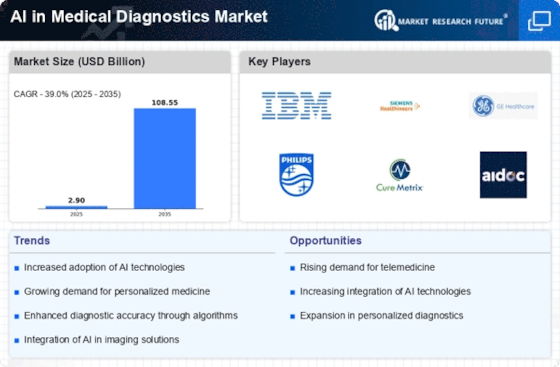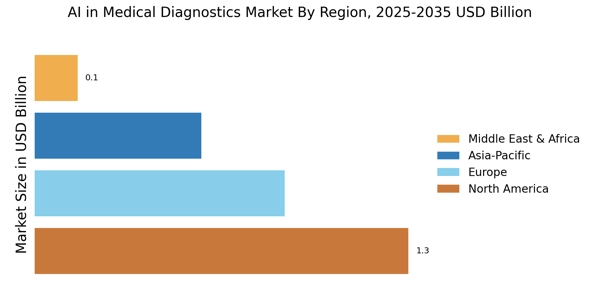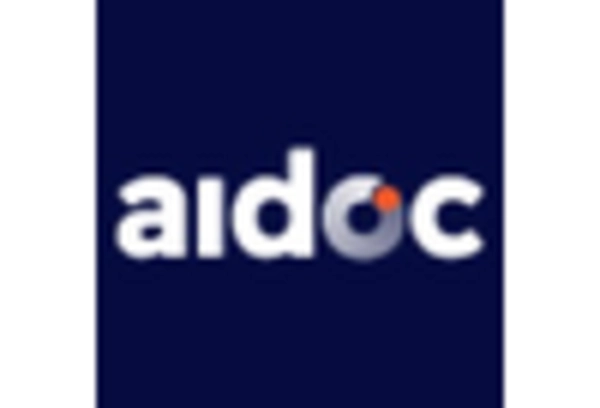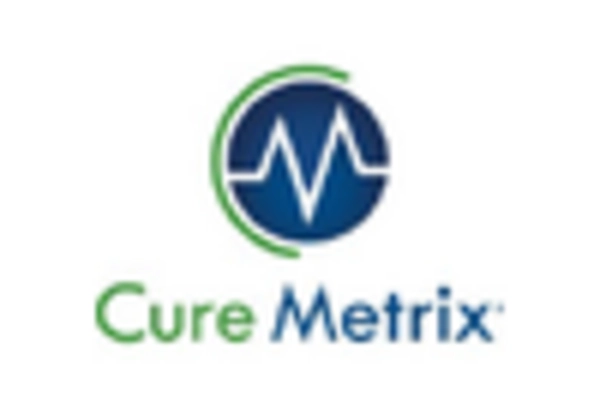Advancements in Imaging Technologies
Technological advancements in imaging modalities are significantly influencing the AI in Medical Diagnostics Market. Innovations in MRI, CT scans, and ultrasound technologies have paved the way for more precise and detailed imaging. AI algorithms are increasingly being employed to interpret these images, leading to improved diagnostic accuracy and reduced human error. For instance, AI can assist radiologists in identifying anomalies that may be overlooked during manual assessments. The market for medical imaging is projected to reach USD 45 billion by 2026, indicating a robust growth trajectory. This growth is likely to be fueled by the integration of AI, which enhances the capabilities of imaging technologies, thereby driving the demand within the AI in Medical Diagnostics Market.
Emerging Applications of AI in Pathology
The emergence of AI applications in pathology is poised to transform the AI in Medical Diagnostics Market. AI technologies are being utilized to analyze pathology slides, enabling pathologists to identify diseases with greater accuracy and speed. This application is particularly relevant in oncology, where timely and precise diagnosis is critical for effective treatment. Recent studies indicate that AI can improve diagnostic accuracy in pathology by up to 20% compared to traditional methods. As the demand for accurate and efficient diagnostic solutions continues to grow, the integration of AI in pathology is likely to gain traction. This trend not only enhances the capabilities of pathologists but also contributes to the overall advancement of the AI in Medical Diagnostics Market.
Rising Demand for Early Disease Detection
The AI in Medical Diagnostics Market is experiencing a notable surge in demand for early disease detection solutions. This trend is largely driven by the increasing prevalence of chronic diseases, which necessitates timely diagnosis for effective management. According to recent estimates, early detection can reduce treatment costs by up to 50%, thereby enhancing patient outcomes. AI technologies, such as machine learning algorithms, are being integrated into diagnostic tools to analyze medical images and patient data more accurately. This integration not only improves diagnostic accuracy but also expedites the decision-making process for healthcare providers. As healthcare systems strive to enhance efficiency and reduce costs, the emphasis on early disease detection is likely to propel the growth of the AI in Medical Diagnostics Market.
Growing Investment in Healthcare AI Startups
Investment in healthcare AI startups is witnessing a remarkable increase, which is positively impacting the AI in Medical Diagnostics Market. Venture capital funding for AI-driven healthcare solutions has surged, with investments reaching approximately USD 4 billion in 2023 alone. This influx of capital is enabling startups to innovate and develop cutting-edge diagnostic tools that leverage AI technologies. As these startups introduce novel solutions, they contribute to the overall growth of the market by enhancing diagnostic capabilities and improving patient care. Furthermore, established healthcare organizations are increasingly collaborating with these startups to integrate AI solutions into their existing systems, thereby accelerating the adoption of AI in medical diagnostics. This trend suggests a promising future for the AI in Medical Diagnostics Market.
Increased Focus on Data-Driven Decision Making
The shift towards data-driven decision making in healthcare is significantly shaping the AI in Medical Diagnostics Market. Healthcare providers are increasingly recognizing the value of data analytics in improving patient outcomes and operational efficiency. AI technologies are being utilized to analyze vast amounts of patient data, enabling clinicians to make informed decisions based on real-time insights. This trend is particularly evident in the management of chronic diseases, where data analytics can identify patterns and predict disease progression. As healthcare systems continue to embrace data-driven approaches, the demand for AI solutions that facilitate these processes is expected to rise. Consequently, this focus on data-driven decision making is likely to bolster the growth of the AI in Medical Diagnostics Market.

















